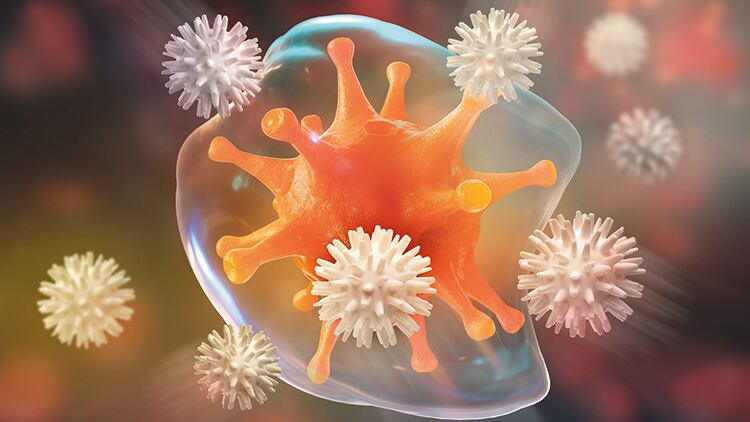The human body is populated by myriads of microorganisms. Each bacterial strain has a genome containing thousands of genes and impacts biological functions and physiological processes.
Some chronic disorders are associated with the loss of richness of beneficial species in the intestinal microbiota. Thanks to a growing body of scientific research, and with World Microbiome Day 2023 shining a light on the importance of microbes for human health and the world around us, the effects of prebiotics on healthy body functions, such as digestion and metabolic health, are becoming better understood and more widely valued.
Prebiotics are designed to stimulate the growth and activity of specific beneficial bacteria in the gut, such as Bifidobacteria and Lactobacilli. By rebalancing the composition of the microbiota within the microbiome, they promote a beneficial effect on gut health which, in turn, can support a range of positive health benefits for the host.
While specific effects of each prebiotic vary, factors common to a high-quality prebiotic can generally be agreed upon. It should easily be fermentable by beneficial gut bacteria, to enable the production of short chain fatty acids (SCFAs) such as butyrate, acetate, valerate and propionate. The SCFAs act as an energy source for colon cells which, in turn, promotes a healthy gut lining and confers health benefits such as modulating immune function.
A prebiotic should be water soluble to facilitate bacterial access and metabolization. Selecting a prebiotic that has been extensively researched is important, too; peer-reviewed scientific studies and, clinical trials and all provide valuable insights into the effectiveness and safety of a prebiotic. These indicate its ability to be well tolerated, with low potential for causing gastrointestinal discomfort, such as bloating or diarrhoea.
As the population of microorganisms in different regions of the intestine varies, a prebiotic which only produces its effect locally may also result in a general imbalance of other bacteria in the rest of the gut. Therefore, a prebiotic which is capable of boosting diversity all through the tract is desirable.
With the increasing consumer demand for clean label products derived from natural sources, it is important to pay close attention to the origin of prebiotics. Moreover, from a manufacturing perspective, it is crucial that prebiotics are compatible with a wide range of food processing and storage methods, including those employed in the production of ice cream or baking goods, among others. Additionally, prebiotics should be suitable for incorporation into ready-to-use supplements, available in various galenic forms such as tablets and capsules.
A prebiotic with extensive effects
Many commercial prebiotics promote the growth of Bifidobacterium spp. and Lactobacillus spp. in the gut microbiota. While these are important bacteria for gut health, their effects can be limited. A new prebiotic on the market has been proven to support microbiota diversity in a superior way. NextDextTM is a food grade, water-soluble prebiotic generated as an extracellular polymeric substance from natural occurring microbial fermentation.
Most prebiotics present a strong variability of final effects in the microbiota depending on the level of dysbiosis at baseline. NextDextTM has shown to produce a highly predictable and homogeneous prebiotic effect in all studies. Furthermore, in the food industry, it has the potential to improve sensorial properties, such as mouthfeel, by increasing water and oil retention which in turn, can enhance perceived freshness and increase shelf-life.
Its competitive edge lies in its unique molecular structure as a dextran with a mixture of high molecular-weight α-glucans with different glycosidic linkages. It is this which enables it to promote a healthy microbiota composition throughout the entire gut from the proximal through to the distal region where a high presence of metabolites with potentially negative effects can be found. This increases the beneficial impact and is scarcely found in the existing prebiotic market.
And, significantly for a population with numerous gastrointestinal symptoms, NextDextTM has an improved tolerance profile; it promotes a low and slow production of gas, shown to be 31% lower than inulin, thereby decreasing the side effects of bloating and abdominal pain that can occur with other prebiotics.
High SCFA production
As a long linear chain dextran, NextDextTM promotes microbial diversity in the gut by increasing the growth and activity of Bacteroides and Faecalibacterium which produce propionic acid and butyric acid.1 Butyric acid is an SCFA for the nutrition and integrity of gut cells and is associated with an improved nutrition of enterocytes and associated protective mucus layer. Furthermore, butyric levels stimulated have been proven to increase even in the presence of antibiotics.
As well as stimulating Bacteroides and Faecalibacterium, NextDextTM has been shown to increase Bifidobacterium and Lactobacillus, the species associated with anti-inflammatory and immune regulating functions in the body. Furthermore, Lactobacillus has been proven to be stimulated even in the presence of Clostridium difficile, a pathogen resistant to many antibiotic treatments typical of the hospital setting.
In a 2020 study, lactic acid production was also shown to be significantly superior to the control; this high concentration indicates that the lactic acid bacteria (LAB) group experiences significant growth stimulation.1
The study also illustrated the prebiotic’s ability to decrease pH levels. This lower level inhibits the growth of Proteobacteria which, in turn, leads to the reduction of pro-inflammatory microbes and their harmful by-products. NextDextTM also decreased pH in the presence of antibiotics or pathogen challenges, helping to promote microbiota modulation in conjunction with commonly used drugs. Its effects in the above areas can promote a range of significant health benefits.
Potential opportunities
NextDextTM manufacturer AB Biotek Human Nutrition & Health works closely in partnership with customers to provide solutions in a range of formats and delivery systems to suit individual requirements. As a broad-spectrum prebiotic, its technological benefits are targeted at both the functional food and nutraceutical industries. Incorporated into functional daily foods, such as baked goods, ice creams and snacks, NextDextTM offers potential health benefits and can contribute to improvements such as mouthfeel and shelf-life.
NextDextTM can also be used as a standalone broad spectrum prebiotic solution or in combination with probiotics and postbiotics. It can be easily incorporated in solid and liquid galenic formulations including tablets, capsules, sachets, shots and gummies, with efficacy scientifically proven from very small quantities.
As the prebiotics industry expands and diversifies, our understanding about the link between the gut microbiome and overall health continues to grow. Within an ever-growing market, selecting a well-tolerated prebiotic with a superior efficacy will help drive repeat purchase required for brands to stand out and succeed.
To find out how the positive effects of NextDextTM can benefit your formulations visit AB Biotek Human Nutrition & Health.
References
1. Amaretti A.; Bottari B.; Morreale F.; et al. 2020. Potential prebiotic effect of a long-chain dextran produced by Weissella cibaria: an in vitro evaluation. International Journal of Food Sciences and Nutrition, 71:5, 563-571, DOI: 10.1080/09637486.2019.1711026.






